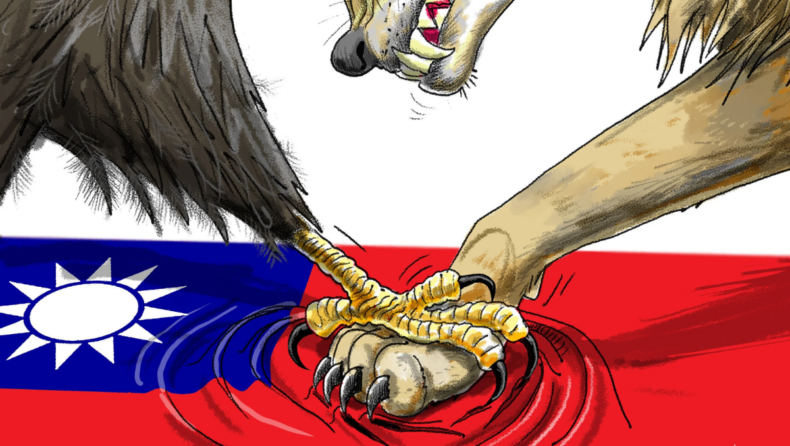On Thursday, China declared that the United States was on a “wrong and dangerous road” after Speaker Kevin McCarthy hosted a meeting between Taiwanese President Tsai Ing-wen and a bipartisan delegation of over a dozen U.S. lawmakers. China has vowed to take retaliatory actions against Taiwan, which it claims as its own, in response to the meeting. While the Biden administration does not consider Tsai’s visit provocative, it comes at a time when U.S.-China relations have reached a historic low, with support for Taiwan being a major point of contention between the two powers. The formalities of the meeting, as well as the high-ranking officials present in the congressional delegation, could potentially escalate the situation, as no speaker has ever met with a Taiwanese president on U.S. soil since formal diplomatic ties with Taiwan were severed in 1979
The Ministry of Foreign Affairs in Beijing released a statement early in the morning, in which it declared that it would take strong and decisive actions to safeguard national sovereignty and territorial integrity in response to the meeting. The statement also advised the U.S. to avoid pursuing a misguided and perilous path.
ROARING DRAGON

Image Source: Foreign Affairs
In December, China displayed its military might by deploying 71 planes and seven ships toward Taiwan within a 24-hour period, after taking issue with Taiwan-related provisions in a U.S. annual defense spending bill. China’s military campaign against Taiwan has intensified in recent years, and it has frequently dispatched planes or ships toward the island. However, there were no visible indications of any significant military retaliation as of Thursday afternoon.
In a statement released on Thursday, China’s Taiwan Affairs Office referred to Taiwanese President Tsai Ing-wen and her political party as separatists and pledged to take decisive action to punish them and their activities while resolutely safeguarding the country’s sovereignty and territorial integrity. Meanwhile, state media reported that Chinese vessels were engaged in a joint patrol and inspection operation in the Taiwan Strait for three days. The Fujian Maritime Safety Administration indicated that its ship, the Haixun 06, would inspect cargo vessels and others in the waters that lie between Taiwan and China as part of this operation.
On Wednesday evening, Taiwan’s Ministry of National Defense confirmed that it had tracked China’s Shandong aircraft carrier passing southeast of Taiwan through the Bashi Strait. On Thursday morning, it detected three People’s Liberation Army navy vessels and one warplane in the vicinity of the island.
Congressional visits to Taiwan have become more frequent over the past year, and the American Institute in Taipei announced the arrival of another delegation on Thursday. The group, led by House Foreign Affairs Committee head Michael McCaul of Texas, comprises eight other lawmakers who will spend three days discussing regional security and trade.
During their meeting on Wednesday, Tsai and McCarthy were cautious not to unnecessarily escalate tensions with Beijing. They stood together at the Ronald Reagan Presidential Library in California and acknowledged China’s threats against Taiwan’s government.
OPEN CHALLENGE TO US

Image Source: Energy Intelligence
Tsai also expressed concern about the challenges faced by Taiwan’s democracy and peace, stating that “the urgency of keeping the beacon of freedom shining cannot be understated.” However, upon arriving in Taiwan, McCaul was more direct in his message to China. “By being here, I think it sends a signal to the Chinese Communist Party that the United States supports Taiwan and that we’re going to harden Taiwan, and we want them to think twice about invading Taiwan,” he told reporters.
During their meeting, Tsai and McCarthy discussed the importance of Taiwan’s self-defense, trade, and participation in the international community. The group plans to talk about weapons delivery to Taiwan, much of which has been delayed, McCaul said.
While the United States formally established diplomatic relations with Beijing in 1979, it remains Taiwan’s key provider of military and defense assistance. The US recognizes that Beijing lays claim to Taiwan under the “one China” policy but does not endorse China’s claim. The US also has a policy of strategic ambiguity regarding its stance on aiding Taiwan in the event of a conflict with China.
Tsai’s visit to Taiwan did not generate much excitement in the country, although fellow politicians paid attention. Former Taipei mayor Ko Wen-je welcomed any exchange between Taiwan and international leaders and called on mainland China to stop its military force suppression. Opposition lawmaker Johnny Chiang of the Nationalist Party said Tsai’s meeting with McCarthy was within the limits of the “one China” policy, showing that while Congress was relatively free to support Taiwan, the White House was more constrained, according to local media.
In August, then-House Speaker Nancy Pelosi’s visit to Taiwan led to China’s largest live-fire drills in decades, including firing a missile over the island. Taiwan and China have had no official relations since their split in 1949 but are connected by billions of dollars in trade and investment.













